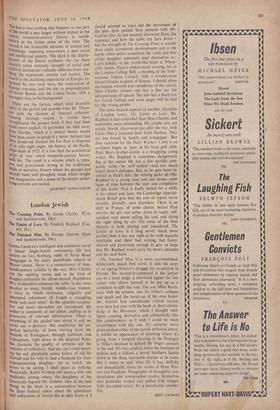London Jewish
The Crossing Point. By Gerda Charles. (Eyre and Spottiswoode, 18s.) The Limits of Love. By Frederic Raphael. (Cas- sell, 18s.)
9eRDA CHARLES'S intelligent and ambitious novel IS 'about' Anglo-Jewisl• community life and centres on Leo Norberg, rabbi of Ferne Road Synagogue in the easily identifiable suburb of Manor Green. There is a reminiscence of nine- teenth-century solidity in the way Miss Charles sets the opening scenes and in the kind of d_otighty certainties she allows herself. Overblown Mrs. Goldenbird addresses the rabbi 'in the voice Peculiar to many Jewish, middle-class women, a voice in which resonance, vulgarity and attempted refinement all fought a strangling battle with each other.' As the episodes accumu- late and more characters are introduced, the author is constantly at our elbow, putting us in Possession of relevant information. There is something of the guided tour about it and we could use a glossary. She establishes the un- spoken hierarchy of Jews, moving from the Spanish or Portuguese, through Germans and Lithuanians, right down to the despised Poles. She discusses the quality of sermons and the varieties of orthodoxy. And she can't resist insert- ing the sad, ghoulishly comic failure of old Sir Oswald and his wife to find a husband for their unprepossessing daughter : let us watch, she seems to be saying, I shall spare .us nothing. Meanwhile, Rabbi Norberg still wants a wife and meditates, among others, the daughters of the fanatically bigoted Mr. Gabriel. One of the best things in the book is a conversation between the three Gabriel sisters about the splendours and suffocation of Jewish life' as they know it. I should attempt to trace out the movement of the plot—how patient Sara remains with Mr. Gabriel after he has insanely disowned Essie, the runaway; and how the rabbi lets Sara down— but the strength of The Crossing Point is outside these oddly novelettish developments and in the harsh, often satiric excursions the rabbi and that errant daughter separately lend themselves to: Leo's holiday in the womb-like hotel at Whyte- chile Sands; Essie's embarrassed evening out at the London College Ball; a meeting of the Inter- national Judean Council, with a twinkly-eyed liberal Gentile as guest of honour. I should stress the human warmth and complexity of the society Miss Charles creates—she has a fine ear for idiosyncrasies of speech She also has a sharp eye for Jewish failings and some pages will be fuel for the wrong people.
The same hazard appears in another chronicle of London Jewry, Th, Limits of Love. Mr. Raphael is less controlled than Miss Charles, and sometimes more stimulating. His people, too, are mostly Jewish, discovered just after the war, with Uncle Otto a nuisance back from Dachau. They are less bound by family and synagogue: Ben does cartoons for the Daily Worker; Colin is an architect happy to 'pass' at his local golf club; Paul, Ben's brother-in-law, is a struggling young writer. Mr. Raphael is sometimes dangerously flip at the outset. He has a few terrible com- posite verbs—'he sniff-smiled'—and too much smart lover's dialogue. But, as he gets more in- volved in Paul's fate, the writing picks up (Mr. Raphael is a young man and one senses some lapse of time between the start and completion of this book). Paul is foully baited for a while at his school and, later, the Cambridge Appoint- ments Board give him the sort of report we've recently, dismally, seen elsewhere. There is an idyll in France, of some charm, before Paul marries the girl and settles down to angry, self- satisfied rant about selling his soul and doing the right thing by art Yet some of the final rhetoric is both stirring and considered. The Limits of Love is a long novel, much more packed than it has any right to be with staccato interludes and sheer bad writing, but funny, shrewd and passionate enough to give us hope that Mr. Raphael won't carry his hero's attitudes into his next book.
The Finished Man is a most accomplished, deliberately paced first novel. It tells the story of an ageing Senator's struggle for re-election in Florida. His second-in-command is the lawyer son of a local judge, a renowned fighter for lost causes who allows himself to be put up as a candidate to split the vote. The son, Mike Royle, stays with the senator, sees his father's collapse and death and the break-up of his own hopes. Mr. Garrett had considerable critical success over here last year with his book of short stories, King of the Mountain. which I thought intel- ligent, cunning, derivative and substantially life- less contrivances—so I wish I could be more circumspect with this one. It's certainly more planned than either of the novels reviewed above; it wields an appearance of knowing where it's going, from a bungled shooting in the Prologue to Mike's decision to defend the Negro assassin at the end. It's very explicit about the business of politics and it follows a proud Southern family down to the deep, inevitable disease at its roots. But it seems to suck what life it has skilfully and parasitically, from the works of Penn War- ren and Faulkner. Paragraphs of thoughtful con- templation and conversation resolve themselves into platitudes looped and puffed with images, little decorated essays. It's a remarkable counter- feit.
JOHN COLEMAN










































 Previous page
Previous page